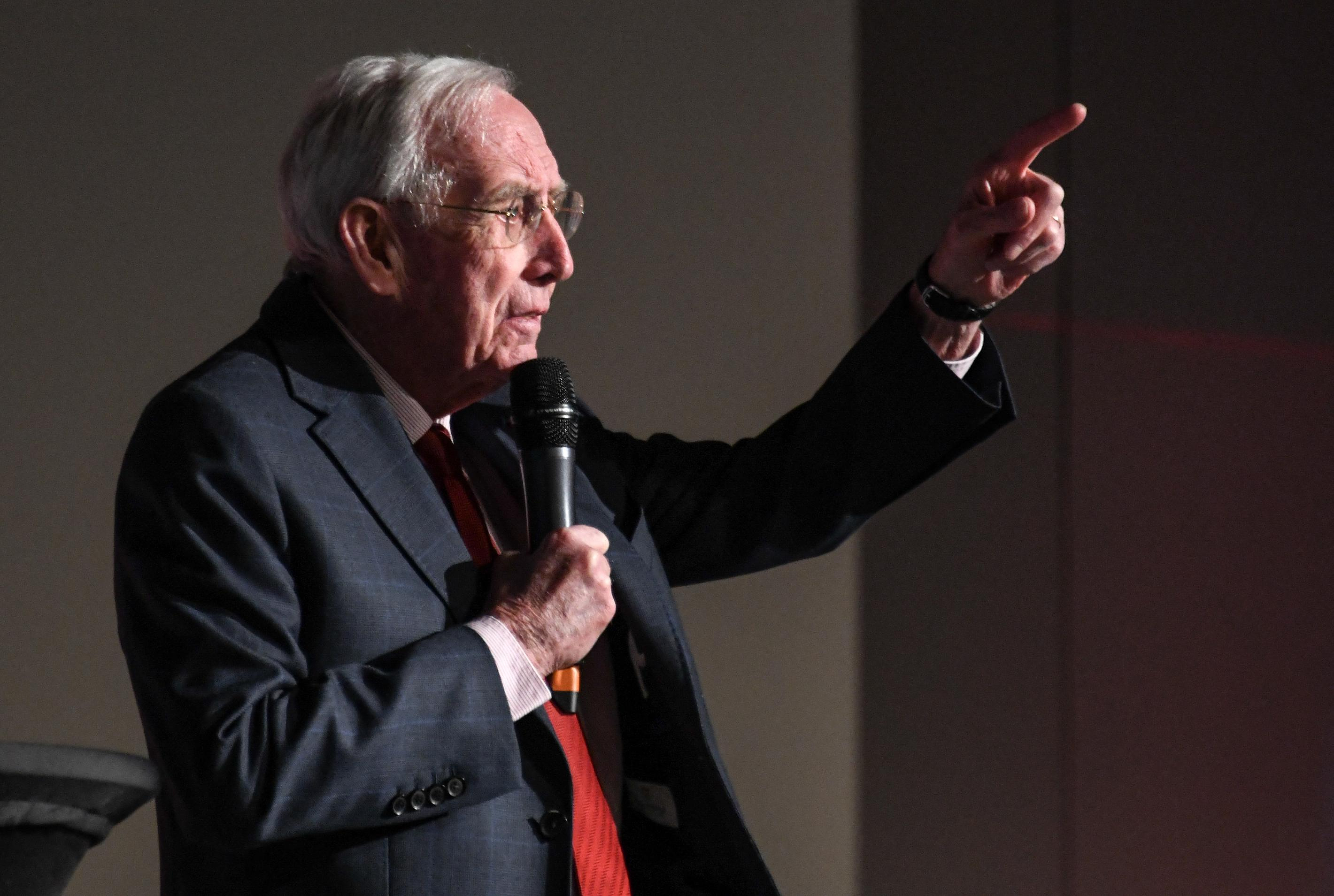In the ongoing legislative process for the electricity and gas price brakes, experts are calling for changes to make them fairer. In a hearing of the Bundestag Committee for Climate Protection and Energy, the experts spoke out in favor of a minimum quota and an upper limit for the state-subsidized gas.
So far, it has been envisaged that the amount of gas with a price cap of twelve cents per kilowatt hour should be based on the previous year's consumption. If you need more than 80 percent of the previous year's consumption, you have to pay the significantly higher market price for the excess amount.
However, this would mean that consumers who have already been economical with energy would be disadvantaged. They could not reduce their consumption as much as other gas customers who have previously heated wastefully. However, the Gas Price Commission had already established that there is hardly any alternative to this method, because the energy companies do not know whether a single or multi-family house is behind a connection or how many people live in a household.
The economist Sebastian Dullien from the Hans Böckler Foundation, which is close to the trade union, now proposed a possible mechanism in the hearing of the Bundestag committee. The state should introduce an upper limit of 25,000 kilowatt hours for the gas price brake. This can then be lifted again if the consumer assures that there is an apartment building behind the connection with the high gas consumption. This information could then be randomly checked and false statements sanctioned.
"That would be easy to do," Dullien said. In any case, it doesn't make sense to him why the energy suppliers in Germany claim that such data collection is not possible, in several neighboring countries it can be implemented without any problems. According to the economist, this measure could not only solve a fairness problem with the gas price brake, but the state would also save 800 million to three billion euros, depending on how the upper limit is designed.
Dullien also received support for his proposals from University of Massachusetts economist Isabella Weber, who also served on the gas price commission. "The situation where we don't know whether a connection is a villa with a private indoor pool or an apartment building is not an acceptable situation," she said.
She spoke out in favor of further developing the gas price brake if necessary if an upper limit and a minimum quota could not be implemented by the start on March 1st. "One must not be satisfied with a built-in social imbalance," she demanded. The high energy prices have an "enormous social explosive force".
Weber also advocated a minimum quota of 6,000 kilowatt hours, for example, to ensure that those who have already saved energy because they don't have much money also benefit from a gas price brake. The economist Henning Völpel from the Center for European Politics (CEP) also advocated such a minimum quota in the hearing. However, he spoke out against an upper limit because this could create the wrong incentive for consumers and suppliers to orient themselves towards this upper limit.
The representatives of the energy industry, on the other hand, warned against changes to the present draft law. "Please no upper limits for alleged reasons of justice with subsequent exceptions for hardship cases," said Ingbert Liebing, Managing Director of the Association of Municipal Companies (VKU), in which many municipal utilities are organized. The managing director of the Federal Association of Energy and Water Industries (BDEW), Kerstin Andreae, warned against changes to the draft law, on the contrary, the complexity must be reduced.
"Everything on shares" is the daily stock exchange shot from the WELT business editorial team. Every morning from 7 a.m. with our financial journalists. For stock market experts and beginners. Subscribe to the podcast on Spotify, Apple Podcast, Amazon Music and Deezer. Or directly via RSS feed.

 Poland, big winner of European enlargement
Poland, big winner of European enlargement In Israel, step-by-step negotiations for a ceasefire in the Gaza Strip
In Israel, step-by-step negotiations for a ceasefire in the Gaza Strip BBVA ADRs fall almost 2% on Wall Street
BBVA ADRs fall almost 2% on Wall Street Ukraine has lost 10 million inhabitants since 2001... and could lose as many by 2050
Ukraine has lost 10 million inhabitants since 2001... and could lose as many by 2050 Sánchez cancels his agenda and considers resigning: "I need to stop and reflect"
Sánchez cancels his agenda and considers resigning: "I need to stop and reflect" The Federal Committee of the PSOE interrupts the event to take to the streets with the militants
The Federal Committee of the PSOE interrupts the event to take to the streets with the militants Repsol: "We want to lead generative AI to guarantee its benefits and avoid risks"
Repsol: "We want to lead generative AI to guarantee its benefits and avoid risks" Osteoarthritis: an innovation to improve its management
Osteoarthritis: an innovation to improve its management Ukraine gets a spokesperson generated by artificial intelligence
Ukraine gets a spokesperson generated by artificial intelligence The French will take advantage of the May bridges to explore France
The French will take advantage of the May bridges to explore France Organic flour contaminated by a recalled toxic plant
Organic flour contaminated by a recalled toxic plant 2024 Olympics: Parisian garbage collectors have filed a strike notice
2024 Olympics: Parisian garbage collectors have filed a strike notice Death of Paul Auster: Actes Sud says he is “lucky” to have been his publisher in France
Death of Paul Auster: Actes Sud says he is “lucky” to have been his publisher in France Lang Lang, the most French of Chinese pianists
Lang Lang, the most French of Chinese pianists Author of the “New York Trilogy”, American novelist Paul Auster has died at the age of 77
Author of the “New York Trilogy”, American novelist Paul Auster has died at the age of 77 To the End of the World, The Stolen Painting, Border Line... Films to watch this week
To the End of the World, The Stolen Painting, Border Line... Films to watch this week Omoda 7, another Chinese car that could be manufactured in Spain
Omoda 7, another Chinese car that could be manufactured in Spain BYD chooses CA Auto Bank as financial partner in Spain
BYD chooses CA Auto Bank as financial partner in Spain Tesla and Baidu sign key agreement to boost development of autonomous driving
Tesla and Baidu sign key agreement to boost development of autonomous driving Skoda Kodiaq 2024: a 'beast' plug-in hybrid SUV
Skoda Kodiaq 2024: a 'beast' plug-in hybrid SUV The home mortgage firm rises 3.8% in February and the average interest moderates to 3.33%
The home mortgage firm rises 3.8% in February and the average interest moderates to 3.33% This is how housing prices have changed in Spain in the last decade
This is how housing prices have changed in Spain in the last decade The home mortgage firm drops 10% in January and interest soars to 3.46%
The home mortgage firm drops 10% in January and interest soars to 3.46% The jewel of the Rocío de Nagüeles urbanization: a dream villa in Marbella
The jewel of the Rocío de Nagüeles urbanization: a dream villa in Marbella Europeans: a senior official on the National Rally list
Europeans: a senior official on the National Rally list Blockade of Sciences Po: the right denounces a “drift”, the government charges the rebels
Blockade of Sciences Po: the right denounces a “drift”, the government charges the rebels Even on a mission for NATO, the Charles-de-Gaulle remains under French control, Lecornu responds to Mélenchon
Even on a mission for NATO, the Charles-de-Gaulle remains under French control, Lecornu responds to Mélenchon “Deadly Europe”, “economic decline”, immigration… What to remember from Emmanuel Macron’s speech at the Sorbonne
“Deadly Europe”, “economic decline”, immigration… What to remember from Emmanuel Macron’s speech at the Sorbonne These French cities that will boycott the World Cup in Qatar
These French cities that will boycott the World Cup in Qatar Top 14: Fijian hooker Narisia leaves Racing 92 and signs for Oyonnax
Top 14: Fijian hooker Narisia leaves Racing 92 and signs for Oyonnax Europa League: Jean-Louis Gasset is “wary” of Atalanta, an “atypical team”
Europa League: Jean-Louis Gasset is “wary” of Atalanta, an “atypical team” Europa League: “I don’t believe it…”, Gasset jokes about Aubameyang’s age
Europa League: “I don’t believe it…”, Gasset jokes about Aubameyang’s age Foot: Rupture of the cruciate ligaments for Sergino Dest (PSV), absent until 2025
Foot: Rupture of the cruciate ligaments for Sergino Dest (PSV), absent until 2025
















